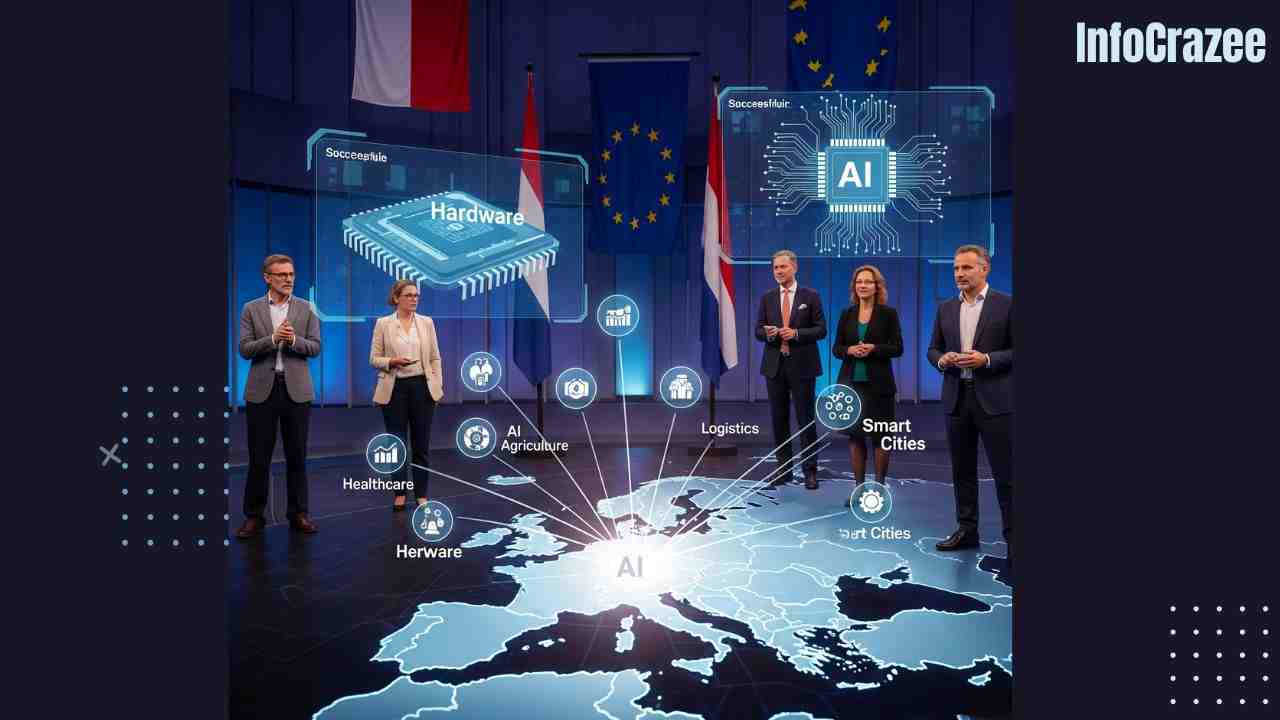Dutch Tech Leaders: Europe’s AI Strength Lies in Applications, Not Hardware
At the TNW Conference in Amsterdam, prominent Dutch technology leaders declared that while Europe may trail the U.S. and Asia in AI hardware development, the continent is poised to lead in building innovative AI applications. This perspective, shared by industry experts and startup founders, highlights Europe’s potential to leverage its robust digital infrastructure, ethical AI frameworks, and collaborative ecosystems to create world-class AI solutions across industries like AI healthcare, AI finance, and sustainability.
“We don’t need to compete with the U.S. on GPU production or supercomputing scale,” said Elvire Jaspers, CEO of WeAreBrain, an Amsterdam-based AI development firm. “Europe, and the Netherlands in particular, excels at turning AI into practical, impactful applications that solve real-world problems.” Jaspers pointed to Dutch startups like Skinive AI, which uses AI to detect skin conditions with medical-grade accuracy, and Owlin, whose natural language processing tools analyze millions of news sources for financial insights, as examples of Europe’s application-driven strength.
Europe’s Competitive Edge
The Netherlands, a hub for AI innovation with the highest density of AI startups per capita in Europe, is leading this charge. A 2021 Techleap.nl report noted that 10% of global AI startups are Dutch, fueled by initiatives like the Dutch AI Coalition and €204.5 million in government funding allocated in 2024 for AI research and development. Key factors driving Europe’s potential in AI applications include:
- Ethical AI Leadership: Dutch initiatives like Kickstart AI, backed by companies such as Philips and ING, and GPT-NL, led by TNO and SURF, prioritize transparent and ethical AI aligned with EU regulations like the AI Act. This focus builds trust and attracts global partners.
- Collaborative Ecosystems: The Brainport Eindhoven region, home to TU Eindhoven and companies like Axelera AI, fosters partnerships between academia, industry, and government, translating research into practical solutions. Axelera’s Metis AI Platform, for instance, powers edge computing applications in retail and robotics.
- Sustainability Synergies: Dutch green tech startups, such as Voltfang and Vind, raised $700 million in 2024, integrating AI to optimize renewable energy systems. “Sustainable energy supports AI’s energy-intensive demands, creating a virtuous cycle,” said Anders Indset of Njordis Group.
- Talent and Infrastructure: The Netherlands’ advanced digital infrastructure, including the Amsterdam Internet Exchange, and tax incentives for tech talent make it a magnet for AI developers, despite challenges in retaining experts long-term.
Hardware Challenges
Dutch leaders acknowledged Europe’s lag in AI hardware, where Nvidia investment and AMD dominate. “The U.S. and China have a head start in chip manufacturing,” said Sumeet Kumar, CEO of Innatera Nanosystems, which develops energy-efficient neuromorphic processors. “But Europe can focus on specialized hardware, like our chips that mimic brain patterns for edge AI.” The Dutch government’s recent deal with Nvidia to supply GPUs for a national AI supercomputing facility aims to bridge this gap, but scaling production remains a hurdle.
Opportunities in AI Applications
Europe’s strength lies in its ability to build on existing AI infrastructure, including Nvidia’s GPUs and cloud platforms like HyperAI’s HyperCLOUD. Promising Dutch AI applications include:
- Healthcare: Vitestro’s AI-powered autonomous blood-drawing device and Quantib’s medical imaging analysis software improve diagnostics and patient care.
- Finance: Sygno’s AI-driven transaction monitoring enhances fraud detection, while Owlin’s news analysis tools uncover market opportunities.
- Agriculture: Space4Good uses AI and satellite data for sustainable farming, addressing environmental challenges.
- Industry: Jungle’s Canopy platform optimizes electromechanical machines, boosting uptime with predictive maintenance.
Challenges and Outlook
Despite optimism, Dutch companies face obstacles. A 2025 AWS report found that 45% of Dutch firms cite a lack of digital skills as a barrier, while 50% of startups struggle with venture capital access. Additionally, 77% of businesses are unclear about their responsibilities under the EU AI Act, potentially slowing adoption. To address these, the Dutch government is investing in digital education and exploring an AI Factory in Groningen.
Reflect the sentiment, with quoting Dutch leaders: “Europe can’t beat the U.S. on AI infrastructure—but can build world-leading apps on top of it.” As Europe leans into its strengths, the Netherlands is poised to drive AI innovation, proving that applications, not hardware, may define the continent’s tech future.






